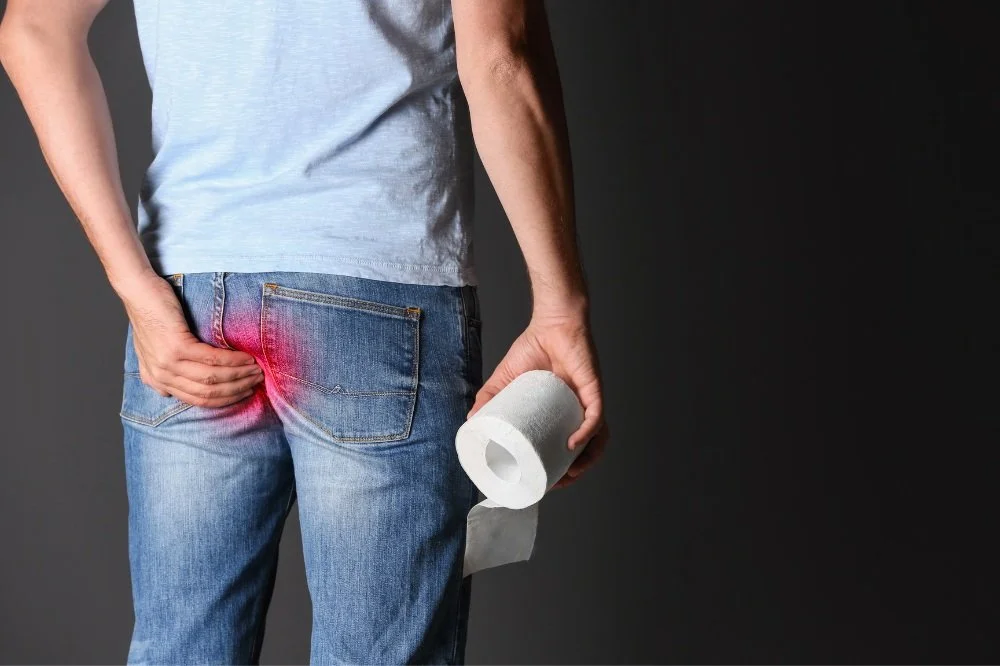Hemorrhoids
Understanding Causes, Symptoms, Diagnosis and Treatment Options
What Are Hemorrhoids?
Hemorrhoids, also known as piles, are swollen veins in the lower rectum and anus. They can be either internal, located inside the rectum, or external, developing under the skin around the anus. While they can be uncomfortable and sometimes painful, they’re usually not serious and can be easily treated. It’s estimated that 1 in 20 people in the United States have had or currently have hemorrhoids, making them one of the most common ailments.
Types of Hemorrhoids
Internal Hemorrhoids: These are located inside the rectum and typically do not cause pain. However, they can cause bleeding during bowel movements.
External Hemorrhoids: These are located under the skin around the anus and can be painful, especially when sitting or during bowel movements. They may also cause itching, swelling, and bleeding.
Causes of Hemorrhoids
Hemorrhoids are caused by any sort of straining that puts pressure on the veins in your anus. The pressure caused by the straining can cause those veins to become swollen. Some of the risk factors that can cause hemorrhoids to develop includes:
Experiencing obesity
Are pregnant
Consume a low-fiber diet
Constipation or diarrhea
Consistently lift heavy objects or weights
Spending too much time on the toilet
Certain factors can increase the risk of developing hemorrhoids, including:
Age: Hemorrhoids are more common as people get older, as the tissues supporting the veins in the rectum and anus weaken over time.
Heredity: A family history of hemorrhoids can increase the risk of developing the condition.
Diet: A low-fiber diet can contribute to constipation, which can lead to hemorrhoids.
Heavy lifting: Regularly lifting heavy objects can increase pressure in the rectal and anal veins.
Symptoms of Hemorrhoids
The symptoms of hemorrhoids vary depending on the type. For internal hemorrhoids, the most common symptom is bright red blood on toilet paper or in the toilet bowl after a bowel movement. Other symptoms may include itching, pain, and swelling in the anal area.
For external hemorrhoids, the signs may include a hard lump near the anus, pain or itching, and swelling. In some cases, external hemorrhoids can also cause a blood clot, which will be very painful.
How Are Hemorrhoids Diagnosed?
If you think you have hemorrhoids, it’s always a good idea to see a doctor to get a proper diagnosis. Your doctor may recommend the following tests in order to diagnose you:
Rectal examination: Your doctor will insert a gloved finger that is lubricated into your rectum to identify for swollen veins.
Anoscopy: It is a procedure that involves your doctor inserting a scope inside the anus and rectum to examine the area.
Sigmoidoscopy: It is a procedure where your doctor will use a sigmoidoscope, which is a small tube equipped with a light and camera, to get a clear look inside your rectum.
Treatment Options for Hemorrhoids
The treatment for hemorrhoids varies, depending on the severity of the condition. Generally, the most common treatments are lifestyle changes, such as increasing fiber and water intake, exercising, and avoiding sitting for long periods of time. Over-the-counter medications, such as creams, ointments, and suppositories, can also help to reduce the symptoms of hemorrhoids.
Minimally Invasive Procedures For Hemorrhoids
In some extreme cases of hemorrhoids, your doctor may recommend you to go with a surgical approach to treat the condition, especially if the traditional and at home treatment do not end up working.
There is a minimally invasive procedure known as hemorrhoid embolization that is used to treat large, symptomatic internal hemorrhoids. It is a relatively new procedure but is gaining popularity as a safe, effective treatment option for patients suffering from the symptoms of severe internal hemorrhoids.
Treat Your Hemorrhoids at Indiana Vascular
Hemorrhoids can be a painful and uncomfortable condition, but with the right knowledge and guidance, you can effectively manage and treat the symptoms. By understanding the causes, recognizing the symptoms, and exploring the various treatment options, you can take control of your hemorrhoid situation and seek relief.
At Indiana Vascular, we offer a facility filled with state-of-the-art equipment and a staff of experienced doctors that specialize in treating hemorrhoids. We will work with you in creating a treatment plan tailored to your individualized needs, and will walk with you every step of the way to ensure a favorable outcome and swift recovery.
Do not allow hemorrhoids to negatively impact your quality of life. Schedule an appointment with us today to receive a consultation and gain insight into the condition, as well as discover how we can enhance your overall health.
Frequently Asked Questions
-
While there is no guaranteed permanent cure for hemorrhoids, adopting healthy lifestyle changes and seeking appropriate medical treatment can help alleviate symptoms and prevent recurrence.
-
While hemorrhoids are generally not life-threatening, they can cause discomfort and affect the quality of life. In rare cases, complications such as anemia from chronic blood loss, strangulated hemorrhoids, or infection may occur. If you experience severe pain or excessive bleeding, consult your doctor immediately.
-
The duration of hemorrhoids can vary, depending on the severity and the chosen treatment method. For mild cases, hemorrhoids may resolve on their own within a few days to a couple of weeks with conservative treatments. More severe cases may require minimally invasive procedures or surgery for complete relief.
-
Mild to moderate exercise, such as walking or swimming, is usually safe and may even help alleviate hemorrhoid symptoms by promoting healthy bowel function. However, it is essential to avoid heavy lifting or intense physical activities that can exacerbate symptoms. Consult your doctor for specific guidance.
Are You Suffering From a Hemorrhoids?
Click below to learn more about the procedure we offer to treat the condition.

